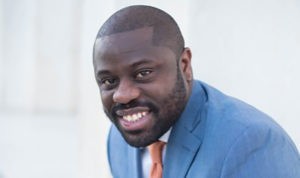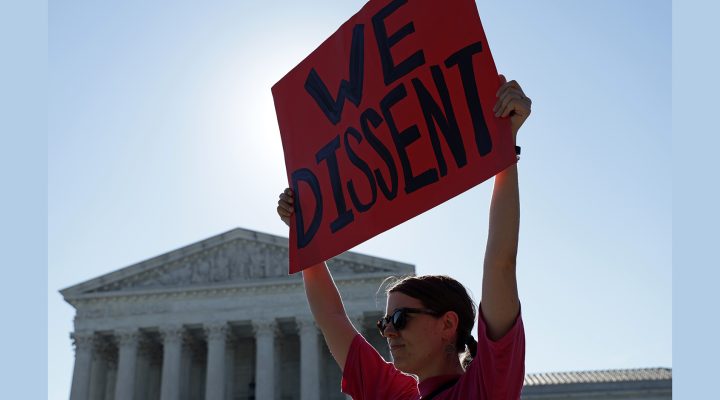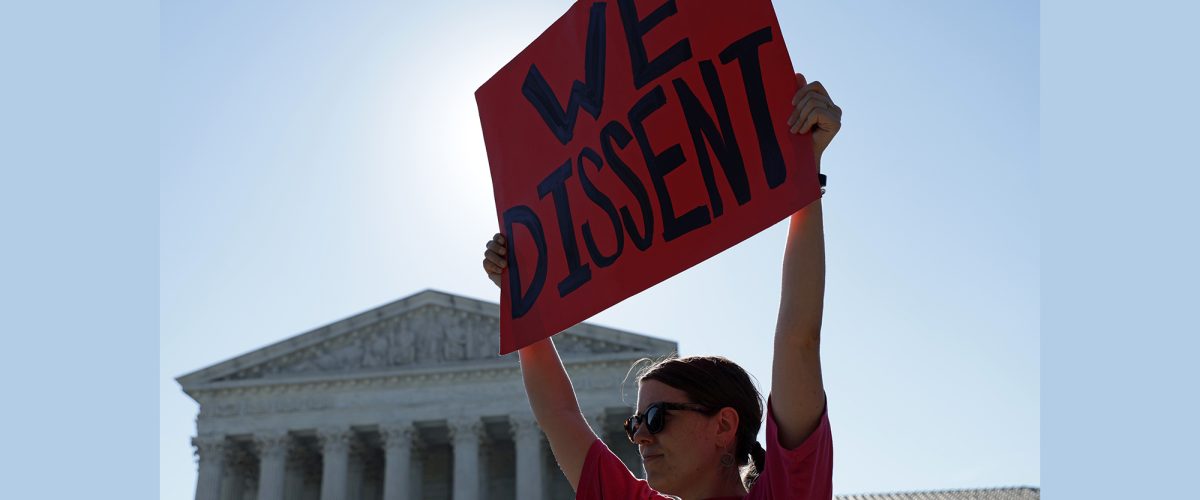The headline read, “In a 5-4 Vote the United States Supreme Court Overturns Roe v. Wade.” While I knew this decision was coming, I still felt a deep pain in my heart and anxiety swell all over my body.
Perhaps it was because of the summer we had been having — in which it felt like there was a mass shooting every week. Or maybe it was because I recently spent time with Alliance of Baptists partners in Fortaleza, Brazil, who were helping me understand their own tense political, social and ecclesial situation. Or perhaps it was all that plus the fact that when I had gotten the news, I was fresh off a plantation in Charleston, S.C., where I witnessed white people casually take maternity photo shoots and promote Trump while ignoring the violence that was visited there upon my ancestors every day.
This feeling of pain, exhaustion and despair was deep but not unfamiliar. It was a feeling I felt when Trayvon Martin’s killer never was punished, when Mike Brown’s body was left for dead, when Breonna Taylor was murdered, and when Donald Trump won the presidential election of 2016.
“We think we should be hopeful and grateful. Many times, we push ourselves to move quickly past what we feel, often because of what we believe — namely that God is ultimately in control.”
It is a feeling I feel today, one where I feel hopeless and powerless. You might feel this feeling too. And often when people, especially in Christian circles, name this feeling we think we should not name it or feel it. We think we should be hopeful and grateful. Many times, we push ourselves to move quickly past what we feel, often because of what we believe — namely that God is ultimately in control.
While I believe God ultimately is in control, the orthodox response from Christians forcing me to hope feels inadequate for the times we live in. It feels more honest for me to say the state of our world, especially our country, still feels really bad. And it seems like there is nothing we can do about it.
I know this familiar feeling
As a Black historian, I am comfortable with this feeling because I know my ancestors had similar feelings and responses, too. In fact, there is a school of thought in the Black Radical Tradition that has given name to this feeling. It’s called Afro-pessimism.

Elijah Zehyoue
Simply put, this is the idea that things have not gotten better and will not get better. On the surface, this school of thought seems to be a slap in the face to the centuries of Black activism and struggle. But when we go deeper, it is quite the opposite.
It is a recognition and reframing of the meaning of Black activism and the need for it to continue. It puts Black activists from Olaudah Equiano and Harriet Tubman in conversation with Ida B. Wells, Ella Baker and Derecka Purnell in order to show a continuous thread from their lives to ours —and to show that the nature of our struggle has not changed. It contextualizes the lived experience of being Black in this society over a period of 400 years and offers wisdom on how to make it through our most despairing times.
One of the main contemporary voices of this tradition is Ta-Nehisi Coates, author of Between the World and Me. In this 2015 work, Coates gives language to the Afro-pessimist tradition when he writes:
In America it is traditional to destroy the Black body — it is heritage. Enslavement was not merely the antiseptic borrowing of labor. It is not so easy to get a human being to commit their body against their own elemental interest. And so enslavement must be casual wrath and random manglings. … There is no uplifting way to say this. I have no praise anthems nor Negro spirituals. The spirit and the souls are the body and the brain which are destructible — that is precisely why they are so precious.
Freedom in pessimism
Coates’ words here have haunted me for seven years since I first read them. And each time I read them again, they trouble me. But they also help free me. They help me understand the world my ancestors lived in, the world I live in, and the world my children are likely to live in if we don’t keep fighting.
He tells us the truth and gives us the opportunity to sit in that truth and grapple with what it means. In that vein, the Afro-pessimist tradition sits in the same tradition as the biblical prophets who told the truth about the world they were living in.
“The Afro-pessimist tradition sits in the same tradition as the biblical prophets who told the truth about the world they were living in.”
Prophets like Amos, who said God hates your feasts and assemblies and the noise of your services and will reject them until justice rolls down like waters and righteousness like a mighty stream.
Prophets like Nathan, who confronted David about the truth of his abuse of power.
Prophets like Mary, who called for release for the captives and freedom for those who were oppressed, who named God as the one who saw the injustice in her world.
Afro-pessimism sits in the truth-telling tradition, and perhaps that is what we need right now: People who tell us the truth about the state of the world. People who don’t lie to us, who don’t falsely comfort us, who don’t tell us everything will be all right when we know that is not the case.
“Perhaps that is what we need right now: People who tell us the truth about the state of the world.”
Perhaps we need truth tellers. And perhaps we need to be people who sit still long enough and listen to the truth so that we can actually figure out what to do with it.
Have you sat long enough to hear the truth of the state of our world? Can you hear, as Rabbi Abraham Joshua Heschel used to say, the high octaves of the prophets? Are you willing to listen to the truth tellers in your midst even in unfamiliar cadences and dialects?
We cannot move forward if we do not take account of where we are. And what we are up against. Only then will we know our options.
The power of dissent
And this is where our truth tellers help us. They show us that one of our options — the main option the prophets, Afro-pessimists, Black radicals and other truth-teller activists historically have taken during the darkest and most despairing moment — is that of speaking the truth and dissenting from the majority when it is in the direction of oppression, violence and tyranny.
This is what Olaudah Equiano did when he wrote his slave narrative in 1789, the same year the Constitution was written, to tell the truth about enslavement. By writing his narrative, he dissented from the majority opinion that enslaved people passively accepted their bondage and that no one at that time knew it was wrong. In book-length form, he told the truth and offered his dissent against the expansion and continuation of enslavement.
“He dissented from the majority opinion that enslaved people passively accepted their bondage and that no one at that time knew it was wrong.”
This is what Sojourner Truth did when she spoke passionately about intersectional experiences of being Black, enslaved and female before the Women’s Convention in 1851. She dissented from the majority opinion, which did not see women as full citizens or Black women as full people. She told the truth about her life and her reality and her place in the world. She dissented against the expansion of enslavement and the continuation of the oppression of Black women at a time that was highly normative, accepted and welcome.
That is what Angela Davis did. She spoke her truth as she represented herself when the state of California tried to give her the death penalty for being a member of the Black Panther Party. She dissented, she used her trial as an opportunity to argue for the rights of Black folks, especially women, queer and otherwise marginalized Black folks. She spoke her truth and out of her experience argued against the way police and prisons were used as a form of social and racial control. She dissented against the majority opinion that still sees our current system of punishment as legitimate.
We must tell the truth
This is what we must do. We must tell the truth about our world and ourselves. We must tell the truth about white supremacy and its manifestations in the Supreme Court, United States Senate, the White House and all over our society.
We must dissent from the majority opinions that impose a structure in which our lives, our bodies, our freedom, dreams and ambitions are seen as less legitimate. We must tell the truth that we are here, that we stand in a tradition that always has been here, that we stand in a tradition that opposes oppression primarily by naming and explaining its existence.
“We must tell the truth about our world and ourselves.”
We must dissent that just because there are rules and norms that are moving away from the direction of human liberation, we are opposed to them and will fight them with our words, our organizing, our lives, our creativity, our theologies, our rituals, relationships, our whole selves.
We stand in a great tradition that clearly sees our despair and understands the tumultuous world that we live in, and that tradition calls us to speak truth in that world and dissent against further oppression. Dissent and truth telling — those are our weapons, and they will help us survive in these challenging times.
I dissent the state of the world and call on you to dissent with me and tell the truth about what we see.
Elijah Zehyoue serves as co-director of the Alliance of Baptists. He is a graduate of Morehouse College and the University of Chicago and is a Ph.D. candidate in African history at Howard University. He teaches African and African American Studies at Georgetown University. Elijah is originally from Liberia, West Africa, and grew up Baton Rouge, La.
This article originally appeared on the Alliance of Baptists website.
Related articles:
Three things white Christians can do to address white supremacy: Lament, repent, dissent | Opinion by Joel Bowman Sr.
Butler and Barr connect the dots between race and gender and patriarchy
There’s a straight line from eugenics to ‘biblical family values’ to white supremacy and the anti-abortion movement | Analysis by Rick Pidcock


